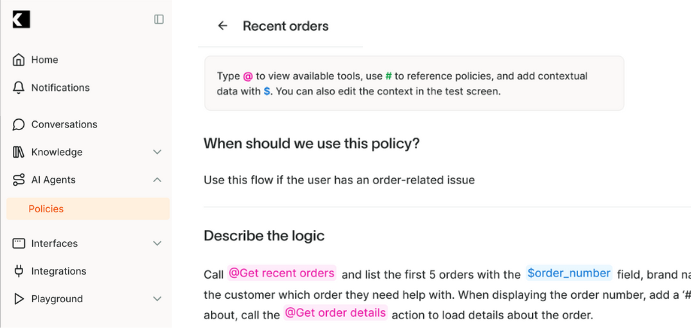Ingredients
The systems used by this policy include Shopify, Zendesk, and Kodif.
What are AI Policies?

At Kodif, we’re excited to announce the launch of Policies—a powerful, dynamic solution designed to revolutionize the way CX managers handle customer support. Unlike traditional flows, which are rigid and complex, Policies empower non-technical users to create and manage customer interactions with ease. Written in natural language, Policies make it simple to define and refine customer experiences without needing to rely on complicated flowcharts or scripting. This approach is not only user-friendly but also self-serve, enabling CX teams to quickly translate existing Standard Operating Procedures (SOPs) into automation, saving valuable time and resources.
The flexibility of Kodif Policies ensures that businesses can offer personalized, context-driven support while continuously improving customer experiences. With Policies, you can experiment with different strategies to optimize outcomes such as CSAT, revenue, and retention—all without the need to rebuild complex workflows. Whether it’s automating routine interactions or testing new approaches for high-stakes scenarios, Policies provide a scalable, adaptable solution that aligns with your business goals. While flows still have their place in sensitive, high-risk situations, Policies offer an agile alternative that helps businesses innovate faster and deliver exceptional, tailored experiences at scale.
“Get order info” ticket type explained
The “Get order info” ticket type in customer support refers to requests where customers seek detailed information about their current or past orders. This could include inquiries about order status, estimated delivery times, tracking details, or any issues encountered during the shipping process. Efficient handling of these tickets is crucial as it impacts customer satisfaction and retention. By automating responses to these common queries, companies can reduce the workload on support teams and improve response times, leading to a more streamlined and satisfactory customer experience.
Which Platforms does this AI policy work on?
This AI policy works seamlessly on Shopify, Zendesk, and Kodif. Additionally, Kodif integrates with all other major platforms, ensuring a comprehensive solution for managing customer support interactions across diverse systems.
When should I use this policy?
This policy should be used when customers want to know the status of their orders. It is particularly useful for addressing WISMO (Where Is My Order?) inquiries, which are common in the e-commerce sector.
Policy logic
To implement this policy, follow these steps:
- Ask for the user’s email address:
- Use
@get_shopify_account_detailstool to check if the user with that email address exists in Shopify. - If the email address is not found, ask for a valid email address.
-
If the email address is still not found, route it to an agent for further investigation.
-
Display Recent Orders:
- Use
@get_shopify_ordersto retrieve the user’s recent orders. - Display the list of recent orders and ask the user which specific order they would like to inquire about.
-
If the order is not found, route to an agent for further investigation.
-
Check Order Status:
- For the selected order, retrieve the shipping status using
@shopify_order_details(order_id: str). - If “Approved”, inform that the order was approved and is waiting to be processed.
- If “Processing”, inform that the order was processed and is waiting to be shipped.
- If “Pending Shipment”, inform that the order is pending shipment and provide a shipment date.
- If “Shipped”, inform that the order was shipped and is in transit, providing the tracking number.
- If “In transit”, use the tool
@shopify_order_detailsto check if the order is within the estimated delivery date. If yes, inform the order is in transit and provide the expected delivery date. If not, inform the customer of the delay and transfer the request to an agent for further investigation. - If “Delivered”, confirm with the customer if the order was delivered.
- If the order was not delivered, route to an agent or create a ticket to escalate for further investigation.
- If “Canceled”, inform that the order was already canceled.
Example policy
Implementing this policy involves using the tools and logic as described above. For example, when handling a “Get order info” request, you start by verifying the user’s email and retrieving their order details from Shopify. The process includes checking order statuses and providing relevant information or escalating to a support agent as needed.
Remember to replace the platform-specific commands appropriately if you are using different systems. For example, if you’re implementing this on Zendesk, ensure that all function calls reflect the correct platform syntax.


